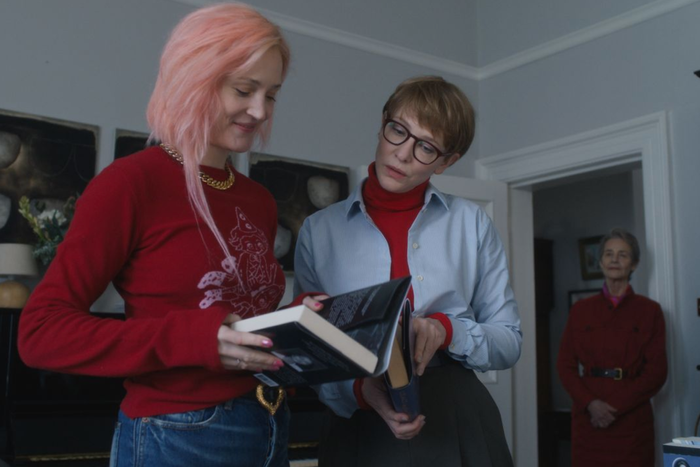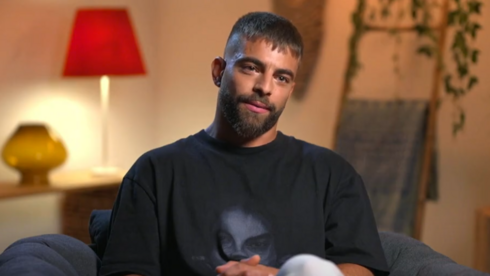
Jim Jarmusch’s Father Mother Sister Brother finds the director in a minor key, which is sometimes his best key. A triptych built around a series of aggressively unremarkable interactions, it feels like a film that the director might have made while waiting to make a different, bigger film. It takes place in three different cities, and at times feels like individual sections might have been shot in a day or two; the cast of heavy hitters, at any rate, probably didn’t need to block out large chunks of their schedules. Anthony Vaccarello, the creative director of Yves Saint Laurent, is credited as a producer (the fashion house has financed a number of shorts and features from acclaimed directors like Gaspar Noé, David Cronenberg, and Pedro Almodóvar), and there are indeed some lovely, color-coordinated clothes in the individual sections, which the characters themselves remark on. Each episode also features a Rolex watch — prominently, almost hilariously. Maybe Jarmusch got money from these luxury brands to make this movie. Or maybe he just wants us to think he did. How far he’s come from the days of Down by Law (1986). And yet, he’s still Jim Jarmusch.
The director has worked in an anthology format before: 2003’s Coffee and Cigarettes consisted of two-character shorts he’d produced over multiple years, almost like little cinematic doodles. But this new film is closer in approach to 1991’s Night on Earth, one of the director’s greatest works. The three episodes of Father Mother Sister Brother are linked conceptually, and they produce a unique overall effect. But they are all, at heart, disarmingly spare exchanges between parents, children, and siblings. In the first, Jeff (Adam Driver) and Emily (Mayim Bialik), drive together to a small Northeastern town for a rare visit to their father (Tom Waits), who seems to have some trouble living on his own — his place is a mess, he often needs money, and Jeff brings him a box of dry goods. But right before they arrive, we see the father starting to purposefully mess up his otherwise very elegant and orderly house. Their awkward ensuing conversation, filled with long pauses, suggests that after all these years, these people know very little about one another. They certainly don’t see each other much: “He’s gonna look old, isn’t he?” Emily asks before they get to dad’s house.
In the second episode, set in Dublin, the very proper Timothea (Cate Blanchett) and the independent-minded Lilith (Vicky Krieps) drive separately for their annual high tea with their successful novelist mother (Charlotte Rampling). Again, nobody seems to have that much to say. Lilith lies to her mom about her life, and who knows if even Timothea (nicknamed Tim) is telling the truth. All the episodes feature people talking about water, which seems at least in the first two sections to denote a kind of mental (or even emotional) emptiness. In one, they ask if they can toast with water; in another, they wonder about the taste of water. It’s the kind of dry, deadpan humor Jarmusch specializes in, and he’s working with great actors who know how to fill empty spaces with subtle emotional activity. The presence of an inner life is crucial to a movie like this, where the underlying point seems to be that people’s lives go on, both parents and children, and that we can never really know one another.
The gently moving third episode, though, ties the whole thing together. Now we’re with twins, Skye (Indya Moore) and Billy (Luka Sabbat), who come together to make one final drive to their parents’ apartment in Paris. Mom and dad died recently, and Billy has cleaned out the flat; Skye just wants to see the old place one last time. The two look through boxes of old photos, the kinds of rarely-looked-at family photos that were on the walls of the homes in the earlier episodes. They sit in the empty rooms and ask questions about their mom and dad, questions they’ll never have the answers to. Theirs seems to have been a happy and unorthodox home, but even here, it seems that these people rarely got together and didn’t often know much about each other.
So, what happens to a tiny movie like this? Premiering in competition at Venice, Father Mother Sister Brother is a simple, quiet movie, one that works the mundane in ways that might remind one of such Jarmusch masterpieces as Paterson (2016) and maybe even Stranger Than Paradise (1984), though it’s much more stripped down and oblique. At times it feels like it could be one of the poems Driver’s character Paterson wrote in the aforementioned film: something intended to be expressed and put away, an idea or a feeling and not much more, maybe to be rediscovered years, decades later. All I know is that by the time it was all over, I was seized with a need to call my parents.
Source link


